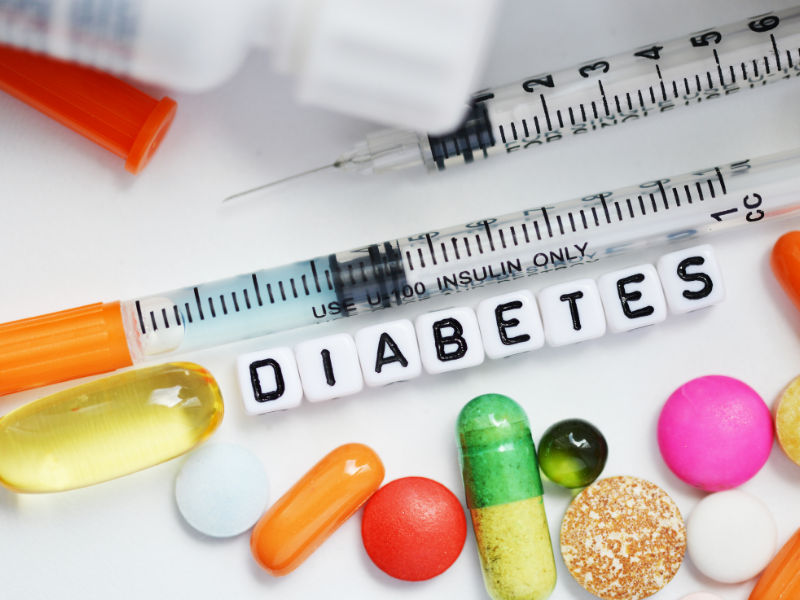
What are the risk factors of diabetes and how to prevent them?
In India, at least 77 million adults live with diabetes and shockingly enough, this number is estimated to double in just 30 years! Diabetes awareness has now become more important than ever. This National Diabetes Month, take the time to understand the causes, identify the symptoms of diabetes so you can contact your nearest healthcare facility for timely medical attention and save lives. Read this blog to further understand the complications and the treatments for diabetes available in India.
Diabetes is a metabolic disease that causes high blood sugar levels in your body. In a diabetic patient, the insulin produced in the body to regularize the blood sugar is either insufficient or not efficiently utilized. Untreated diabetes can cause an array of health defects such as damage to the eyes, nerves and even kidneys.
.png)
> What are the types of Diabetes?
Diabetes can be classified into 4 types:
-
Type 1 Diabetes: An autoimmune disorder, type 1 diabetes occurs when your immune system attacks and destroys the cells that produce insulin in your pancreas. Although the exact cause is unknown, genetics play a very important role. It is also possible that a foreign virus may have set off the immune system attack.
-
Type 2 Diabetes: Genetics and lifestyle factors can sometimes make your body resistant to insulin, making it difficult to regulate your blood sugar levels.Being overweight is recognized as one of the leading causes of type 2 diabetes in India.
-
Prediabetes: This is the type that occurs just before type 2 diabetes. Your blood sugar appears higher than normal but not quite in the diabetes range yet. Significant changes to your diet, exercise and weight control can help contain it.
-
Gestational Diabetes: Some women may develop gestational diabetes as a result of insulin-blocking hormones developed by the placenta during pregnancy. It usually goes away after the pregnancy but may leave you at a risk of getting type 2 diabetes later.
> What are the symptoms of Diabetes?
Diabetes manifests several symptoms. Recognizing them at the earliest will give you an opportunity for timely medical care and a better diabetes management plan. Some of the common signs to watch out for:
-
Increased Hunger & Thirst
-
Weight Loss
-
Frequent Urination
-
Blurry Vision
-
Extreme Fatigue
-
Sores that don’t heal
> Symptoms can sometimes differ depending on the type of diabetes that you are at a risk of:
-
Type 1 Diabetes: Along with the common diabetes symptoms, tiredness, mood swings and extreme hunger & thirst may also be an indication of type 1 diabetes.
-
Type 2 Diabetes: Because of the elevated glucose levels, recurring infections can also be an alarming sign.
-
Gestational Diabetes: Most cases of gestational diabetes do not produce any symptoms. Any changes in the blood sugar levels is only detected in a routine blood checkup. In rare cases, women with this type of diabetes experience increased urination and thirst.
> What are the risk factors of Diabetes?
Certain factors that increase your risk of diabetes are-
-
Type 1 Diabetes: You are more likely to get it if you-
-
Are a child or a teenager.
-
Have a close family member with the same condition.
-
Carry certains genes that are linked to the disease.
-
Type 2 Diabetes: Risk of Type 2 Diabetes increases if you-
-
Are overweight or obese.
-
Are aged 45 and above.
-
have a close family member with the condition.
-
lead an inactive lifestyle
-
have had gestational diabetes
-
have prediabetes
-
have high levels of blood pressure, cholesterol, or triglycerides
-
Gestational Diabetes: You are at risk if you-
-
are overweight and above the age of 25
-
had gestational diabetes during a past pregnancy
-
have a family history of type 2 diabetes
-
have polycystic ovary syndrome (PCOS)
.png)
> What are the treatments available to manage diabetes?
Doctors advise diabetes to be treated with minimal medication. Some of them are available in the oral form while the others in the form of injections.
While type 1 diabetes is best treated with insulin that replaces the hormone your body can’t produce, type 2 is best controlled with a good diet and an exercise regimen. Only when lifestyle changes don’t change the condition, further medication is prescribed.
Gestational diabetes is monitored through a series of tests several times during your pregnancy. Depending on this either dietary changes or insulin can be prescribed by your doctor.
> How to cut down on the risk of diabetes?
Although the genetic or age factors are not in your control, type 2 diabetes can be prevented by following a strict diet plan and a workout schedule. You can try and include-
-
At least 150 minutes of light to moderate cardio by walking or cycling.
-
Fresh fruits, vegetables and whole grains in your diet.
-
Smaller portions and cut down on trans fatty foods and refined carbs.
-
A medically approved regimen to reduce 7% of your body weight if you are overweight or obese.
Diabetes is a chronic problem and increasingly drastic lifestyle factors are worsening the incidence of cases in India. One must be vigilant by making conscious, healthy diet choices and staying fit and active to prevent type 2 diabetes.
Visit the Diabetes Wellness Centre at A.J. Hospital and Research Centre to voice your concerns today.
